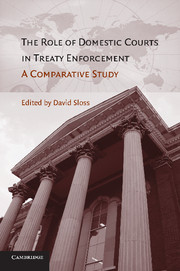Book contents
- Frontmatter
- Contents
- Contributors
- Preface
- Acknowledgments
- 1 Treaty Enforcement in Domestic Courts: A Comparative Analysis
- 2 Does International Law Obligate States to Open Their National Courts to Persons for the Invocation of Treaty Norms That Protect or Benefit Persons?
- 3 Australia
- 4 Canada
- 5 Germany
- 6 India
- 7 Israel
- 8 The Netherlands
- 9 Poland
- 10 Russian Federation
- 11 South Africa
- 12 United Kingdom
- 13 United States
- 14 The Role of Domestic Courts in Treaty Enforcement: Summary and Conclusions
- Index
6 - India
Published online by Cambridge University Press: 06 January 2010
- Frontmatter
- Contents
- Contributors
- Preface
- Acknowledgments
- 1 Treaty Enforcement in Domestic Courts: A Comparative Analysis
- 2 Does International Law Obligate States to Open Their National Courts to Persons for the Invocation of Treaty Norms That Protect or Benefit Persons?
- 3 Australia
- 4 Canada
- 5 Germany
- 6 India
- 7 Israel
- 8 The Netherlands
- 9 Poland
- 10 Russian Federation
- 11 South Africa
- 12 United Kingdom
- 13 United States
- 14 The Role of Domestic Courts in Treaty Enforcement: Summary and Conclusions
- Index
Summary
THE STATUS OF TREATIES IN THE DOMESTIC LEGAL SYSTEM
The Nature of the State
India is a Union of States. The Constitution of India, which was adopted by a constituent assembly in 1949, defines the distribution of power in the Union List, a State List and a Concurrent List. Parliament (i.e., the President and the two Houses, known as the Council of States and the House of the People) may make laws for the whole or any part of the territory of India, while a state legislature may make laws for the whole or any part of that state. Parliament alone has exclusive power to make laws with respect to any of the matters enumerated in the Union List. Among these is “[e]ntering into treaties and agreements with foreign countries and implementing of treaties, agreements and conventions with foreign countries.” The executive power of the Union is vested in the President and is exercised by the President either directly or through officers subordinate to him or her. This power extends to “the matters with respect to which Parliament has power to make laws, and to the exercise of such rights, authority and jurisdiction as are exercisable by the Government of India by virtue of any treaty or agreement.” In the exercise of functions, the President acts on the advice of the Council of Ministers, headed by the Prime Minister. Treaties are entered into in the exercise of the executive power of the Union.
- Type
- Chapter
- Information
- The Role of Domestic Courts in Treaty EnforcementA Comparative Study, pp. 243 - 272Publisher: Cambridge University PressPrint publication year: 2009
- 1
- Cited by

